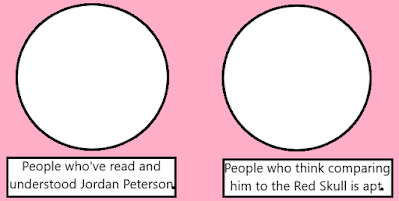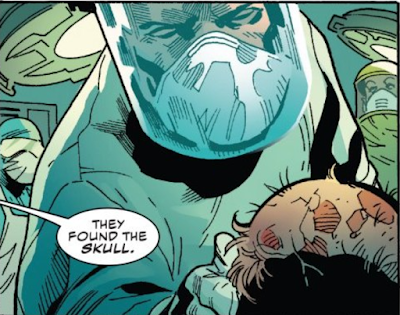I'm sure you've heard this one a million times before: "Comics have always been political. Don't you remember that time Captain America punched Hitler in the face?"
The latest purveyor of this canard is Kurt Busiek, who took to Twitter this week to lecture #Comicsgaters for our supposed failure to understand this fact. But bruh -- as much as I loved your 1998 runs on Iron Man and the Avengers, you're revealing your ignorance about our true position.
No one is actually saying comics should be completely apolitical. First of all, that's impossible. We can't help but inject our worldviews into our creative work. Secondly, that would be boring. The reason why we human beings get exercised over politics is that we're fighting over things that actually matter. And stories? Yes, they need to talk about things that matter -- which means, at times, they need to address politics.
But there are good ways and bad ways to incorporate politics into comics -- and here's where we get to the meat of what #Comicgaters are really saying. When we bitch about Current Year comics being "too political," we are are complaining about the following:
- an excessive reliance on political themes.
- a lack of subtlety in addressing those themes.
- a boring uniformity of perspective.
- the warping of established characters to serve political ends.
An excessive reliance on political themes.
Comics in earlier eras sometimes got political. But most of the time, our heroes battled archetypes -- such as the lowlife thug or the megalomaniac with ambitions to dominate the world. Tony Stark, Light of My Life - just to pick one example - was most often pitted against organized crime, unscrupulous business competitors, and - oh, yes - a dude wielding ten alien rings. And that's when he wasn't battling his own psychological maladies! Indeed, the very best Iron Man comic in history, in my view, is one in which the only villain is Tony's own alcoholism.
Today, however, creators seem hell bent on injecting their political views into everything. As I observe in a video I uploaded to YouTube yesterday (which will be linked here in this Sunday's post), this very tendency is what ruins last week's Rescue 2020. What could've been a fascinating reflection on the feasibility of scientific resurrection is disrupted by annoying, off-topic feminist twaddle. And this is not an isolated case. This kind of storytelling failure can now be found everywhere.
A lack of subtlety in addressing political themes.
Sometimes, earlier comics would be on the nose -- particularly during wartime when the demand for patriotic propaganda was high. But be honest: are those the comics that truly endured? Or are they just looked upon as amusing historical curiosities -- or as convenient examples to deploy when you want to justify your own bad writing?
No: comics that last universalize. The X-Men absolutely were an allegory for the marginalized. But that's the point: they were an allegory. They allowed writers in earlier eras to tackle themes of prejudice and discrimination from a timeless distance. The upside to this approach? Those comics don't have an expiration date. They're always accessible.
Writers these days, on the other hand, seem to have no patience for subterfuge. Instead, they slap you right across the face with their so-called "resistance." Thus, their comics are both dated and extremely parochial. Like the Hitler-punching comics of World War II, they will not be endlessly re-read.
A boring uniformity of perspective.
Yes: the comics industry has always had a leftward lean. But in earlier eras, there was still an observable diversity of thought among writers and artists. Steve Ditko, the Objectivist, was allowed a place at the table. And more recently, so was Chuck Dixon.
In Current Year, meanwhile, the left is doing everything it can to purge the comics industry of even vaguely contrary voices. Hell: regardless of your own views, if you even so much as talk to a known dissenter, you're now a prime target for cancellation. See also: Blake Northcott, who's being stalked right now by a bitchy comic book Karen who imagines herself to be a legitimate political commissar. The result of campaigns like this? A monoculture. If you work at one or more of the major publishers, you can only be out and proud if you're an adherent of the D.I.E. religion and agree that Orange Man Bad.
And the more strict and picayune the enforcement of the aforementioned monoculture becomes, the more radical - and more predictable - the books become. When political topics are addressed, they're almost always addressed in the exact same way -- to the point that we all make jokes now about the ubiquity of the straight, white male villain; the female character who wuvs da science; or the butch, black lesbian.
For Christ's sake, do something else.
The warping of established characters to serve political ends.
It's fair to say that the comics of earlier eras, for the most part, expressed a broadly liberal worldview. But what did that mean exactly?
Well, for one thing, it meant that Captain America went on record defending free speech for bigots:
 |
| Click to embiggen. |
It also meant a rejection of retaliatory, supremacist attitudes, as we see here with Machine Man:
The comics of earlier eras were generally pro-Civil Rights, pro-worker, and skeptical of war. Tony Stark - to once again dip into the lore I know the most about - eventually left the weapons business for more idealistic pursuits, was very generous with his employees, and always demanded ethical conduct from his corporate board. But to suggest that you can draw a straight line from this sort of classical progressivism to today's radicals is to pull a fast one. No: SJW writers have more in common with an Iron Man villain like Firebrand - the guy who wanted to start riots and tear down the system - than with the legacy heroes.
And because a bunch of Firebrands are now in charge of the comics sold in the direct market, said legacy heroes? They're being absolutely butchered. The most recent simulacrum of Tony Stark is dead now (sorry about that spoiler), but before his demise, he was leading a terrorist movement. Steve Rogers has been deconstructed and consequently robbed of his agency. She Hulk has apparently become a violent feminist vigilante. The X-Men are now segregationist mutant supremacists. Need I go on?
TL;DR: There's no continuity between early canon and the present. On the contrary, there's been a fundamental rupture.
Conclusion:
To be sure, none of the above commentary is meant to suggest that there are no readable comics coming out of the mainstream industry. There are -- but they're getting increasingly harder to find amongst all the dreck. And yes: we contend this is because comics have become "too political" in all the ways described in this post.
If you're going to argue against this charge, at least take the time to accurately comprehend what we mean.








